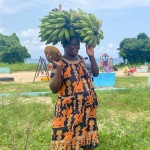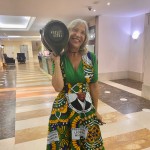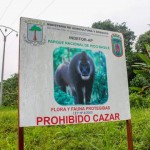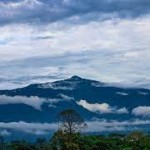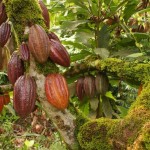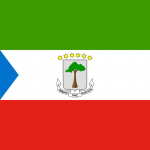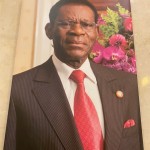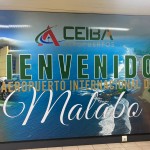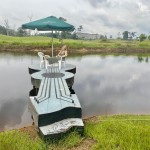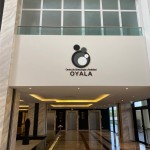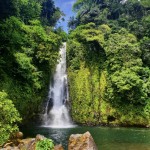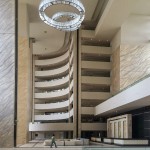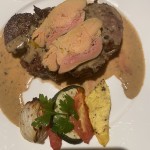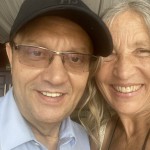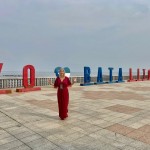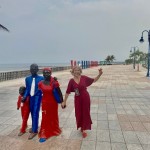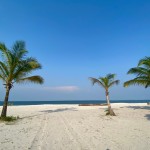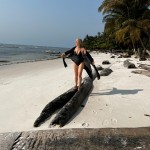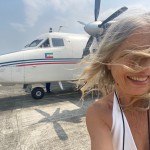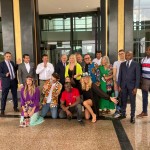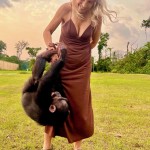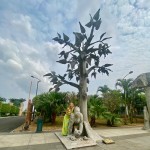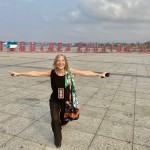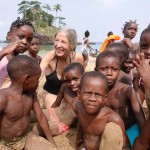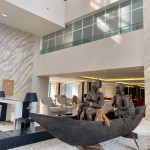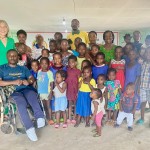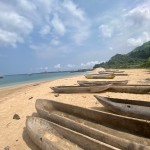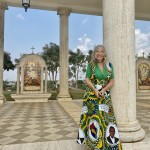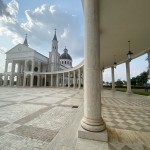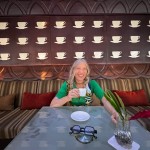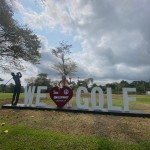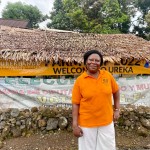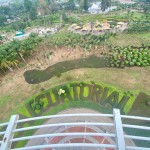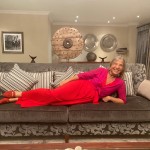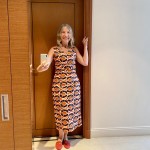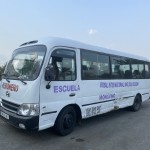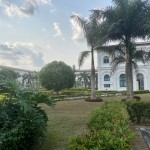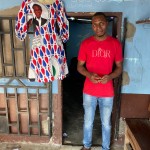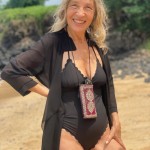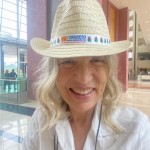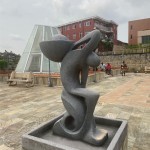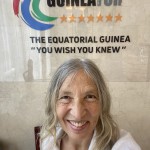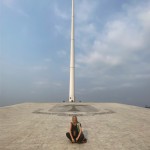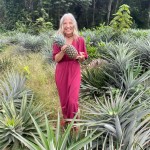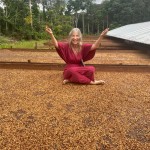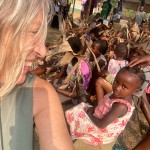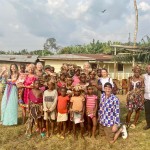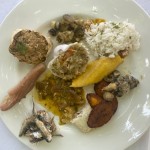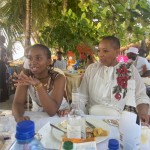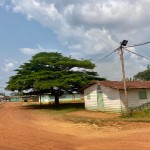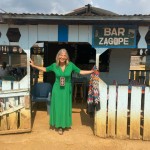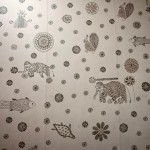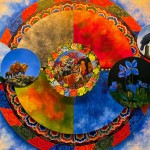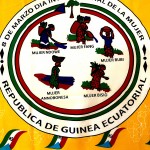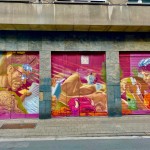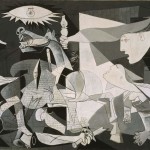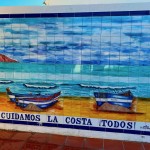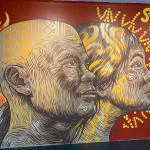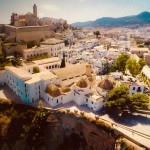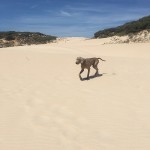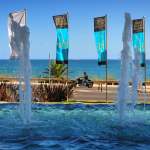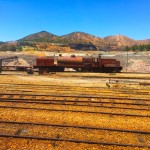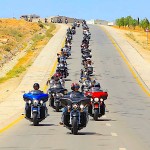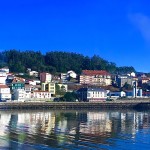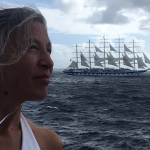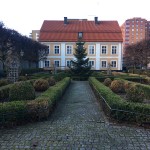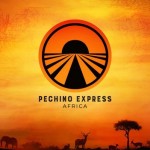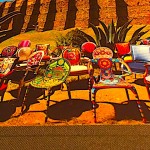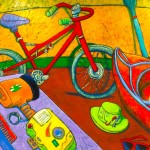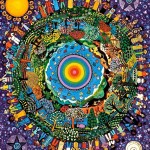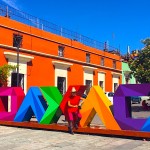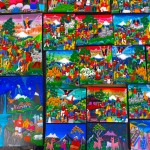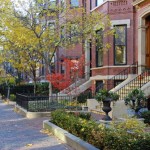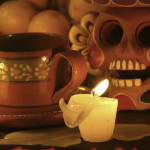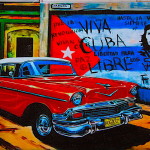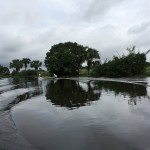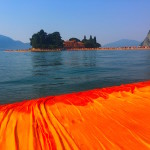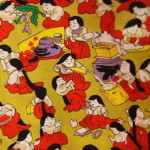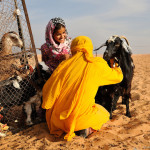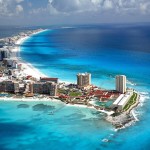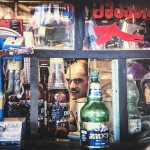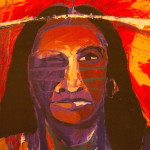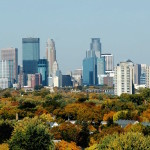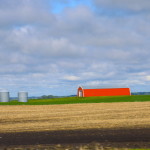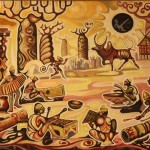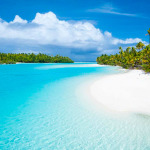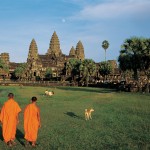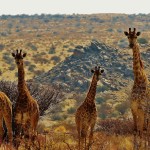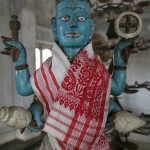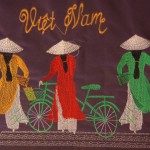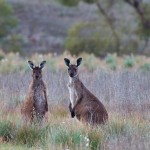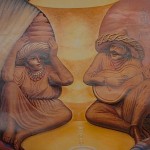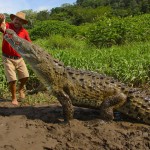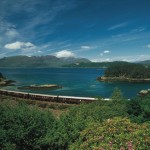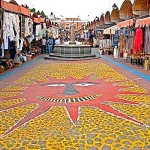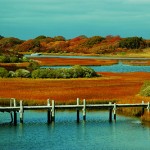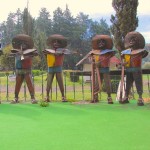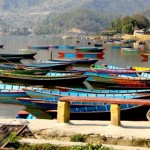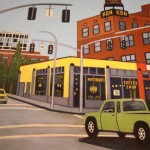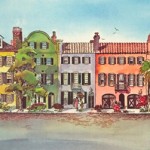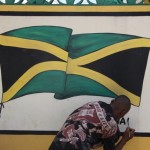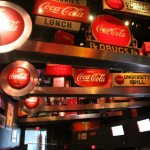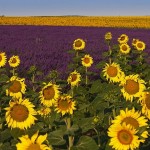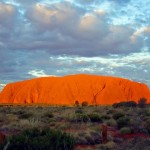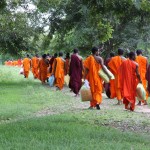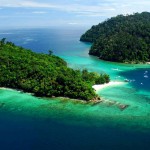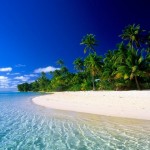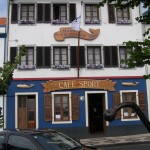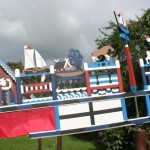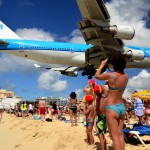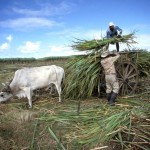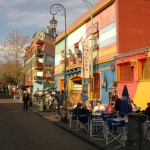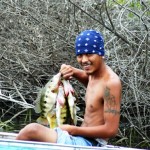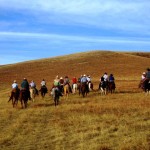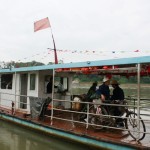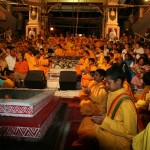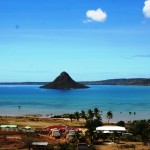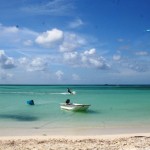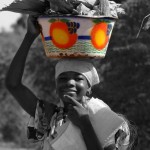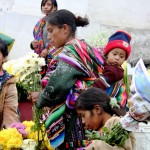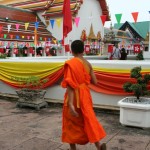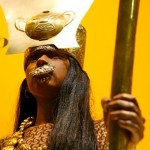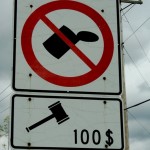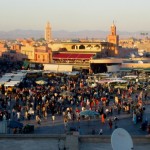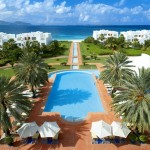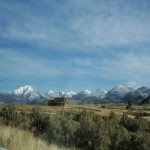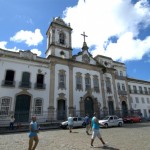In Equatorial Guinea there is an island that has a particularity. On the island of Bioko, in fact, there is Malabo which is the capital of this small state in central Africa still unknown to most which on the mainland borders Cameroon to the north and Gabon to the east and south. We overlook the Gulf of Guinea, among palm trees, coffee, cocoa, long white and other black beaches. A dense wild jungle that is part of the largest tropical rainforest in the world after the Amazon, and which often reaches almost to the water. A place that deserves the attention of travelers because it is concentrated of authenticity and of an unexpected Nation.
- Le stampe dei tessuti delle donne Guineiane sono fantasiose
- Uno dei tessuti con la faccia del Presidente per le recenti elezioni
Equatoguinean women, wrapped in wonderful colorful fabrics, are highly regarded, it is no coincidence that important roles of political and administrative power are in their hands, as evidenced by the famous Plaza de las Mujeres also, very close to the Los Angeles district where there is a fresh fish market known throughout the country.
- Pico Basilé è un Parco protetto (foto by atlas obscura)
- Pico Basilé
But the “undisputed star” of Malabo is Pico Basilé, a 3,011-metre volcano which is the highest peak in all of Equatorial Guinea and which, metaphorically, watches over the village of Ureka in the middle of banana plantations where it is surprising to see a high waterfall that plunges directly into the sea (when there is no low tide).
- La pianta del cacao
- Bandiera della Guinea Equatoriale
Nearby, Moka (capital of agriculture) and Riaba, with herds of cattle, goats and pigs that get lost among the papaya fruits and those of the dragon with blood red pulp.
The whole nation is waiting for the administrative capital, with the name of Ciudad de la Paz, to be transferred to the continent. The “headquarters” will develop around the super-luxurious Grand Hotel Djibloho where the eclectic mind of the Deputy Secretary of State (Councilor for Tourism, Culture and Craft Promotion), Mrs. Catalina Martinez Asumu, has chosen the Italian Vincenzo Presti as right hand man, deus ex machina of the entire renovation group.
- Teodoro Obiang Nguema Mbasogo, President of Equatorial Guinea
- Arrivo all’aeroporto internazionale di Malabo sull’isola di Bioko
Teodoro Obiang Nguema Mbasogo, President of Equatorial Guinea since 1979 and holder of the world record for longevity in power (except for the monarchies) wants tourism to become a strong point. And last November 20 he presented himself to the elections and obtained the sixth mandate. He and his wife Doña Costanza are well respected and their faces stick out everywhere, even in the most remote places.
- Sulla chitarra del Campo da golf del Grand Hotel Dijibloho
- Il Grand Hotel Dijibloho ha all’interno anche OYALA, una clinica per affrontare problemi di sterilità ed eventualmente fare la fecondazione
With this aim, Equatorial Guinea is already activating the digital visa, another sign of progress that will avoid the rush and the wait at the Embassy.
Poverty is not seen on the street and no one has ever asked us for alms.
On the other hand, thanks to oil, Equatorial Guinea has the third GDP of Africa and, with over 95% of Catholics (and even 5 Bishops for 1.6 million people) the atmosphere is peaceful and we have never felt in danger, not even at night.
The future is galloping in and the first major events are already planned, besides the rest Equatorial Guinea will also be the venue of the African Film Festival with the presence of international Nollywood filmmaker and actors.
- La cascata di Ureka
- Grand Hotel Djibloho, la maestosità dell’ingresso
Around the future capital many very small villages such as Nemebe, where you can experience the slow life, for us very attractive, of a community that has suffered the exodus of young people. Or Mongomo with the Cathedral of the Immaculate Conception between Italian marbles and long porticoes inspired by St. Peter’s.
- Anche delizie internazionali sia per il palato sia per gli occhi
- Con Emanuele Mercanti, responsabile assieme ai cuochi di ogni ricetta proposta
At 177 km from the Ciudad de la Paz there is Bata, a lively coastal town (and we are still on the continent), with its 15 km long promenade, where the living and wild jungle a few tens of kilometers away is the habitat of crocodiles, dragons of Comodo, Gabon adders, white-necked cobras, snakes and entire families of chimpanzees. Not far from the library named after John Paul II, on the road towards Mbini there is the grandiose finca of San Clemente coffee which, for curious collaborations, has its beans roasted in our Sicilian Modica (could it be for this reason that their coffee is the best we have tasted?).
- I love Bata
- Sul lungomare di Bata
The official language spoken is mainly Spanish (together with French and Portuguese) and it is therefore easy to communicate with the locals, but the ancient native languages of the tribes we have come across, the Benga, the Fang, the Mangue (to which belongs doña Costanza), for us they are really incomprehensible.
In any case, natural beauties always relax the eye. In particular we loved the colours on the little island of Corisco which is compared to the African Maldives thanks to the white talcum powder arena, and on the island of the extinct volcano of Annabon with its large stack a few meters from the shore, that enchants with the typical wooden boats on which all the kids have fun every day.
- Catalina Martinez Asumu (appena confermata Secretaria de Estado de Cultura, Turismo, y Promoción Artesanal)
- La Playa Blanca di Corsico
Equatorial Guinea still has yet another incredible showpiece, especially for our biological rhythms: we are on the equator and we enjoy its climate, but despite several hours by plane the local time is the same that we have. So, no forward or backward clock hand. We will have our time and enjoy it all, without the inconvenience of hours invested in jet lagging.
What more could you want?
ITALIANO: In Guinea Equatoriale c’è un’isola che presenta una particolarità. Sull’isola di Bioko, infatti, c’è Malabo che è la capitale di questo piccolo stato dell’Africa centrale ancora sconosciuto ai più e che sul continente confina con il Camerun a nord e il Gabon a est e a sud. Siamo affacciati sul golfo di Guinea, tra palme, caffè, cacao, lunghe spiagge bianche e altre nere. Una fitta giungla selvaggia che fa parte della foresta pluviale tropicale più estesa al mondo dopo l’Amazzonia, e che spesso arriva quasi fino in acqua. Un luogo che merita l’attenzione dei viaggiatori perché concentrato di autenticità e di una nazione inaspettata.
- Sulla spiaggia del villaggio Magane Say di Corisco
- Per andare all’isola di Corisco si vola con aeroplani a elica
Le donne equatoguineane, avvolte in meravigliose coloratissime stoffe, sono molto considerate, non a caso importanti ruoli del potere politico e amministrativo sono nelle loro mani, lo testimonia anche la famosa Plaza de las Mujeres, molto vicina al quartiere Los Angeles dove c’è un mercato di pesce freschissimo noto in tutto il Paese.
Ma il “protagonista indiscusso” di Malabo è il Pico Basilé, un vulcano di 3011 metri, che è la vetta più alta di tutta la Guinea Equatoriale e che, metaforicamente, sorveglia il villaggio di Ureka in mezzo a piantagioni di banani dove sorprende vedere una cascata che si getta in mare.
Nei dintorni, Riaba e Moka, capitale dell’agricoltura, con mandrie di bovini, capre e maiali che si perdono tra i frutti di papaya e quelli del dragone dalla polpa rosso sangue.
- Dietro, IV da sinistra, Vincenzo Presti (con sua moglie Anna con golf giallo). E terzo da sinistra, Emanuele Mercanti straordinario responsabile della nostra accoglienza. Dietro Vincenzo e Anna spunta tra i giornalisti anche Bruno Liconti (grande conoscitore dell’Africa). Tutti in uscita dal Grand Hotel Djibloho.
- Con Hope, uno dei 3 scimpanzè che il Grand Hotel Djibloho ha salvato da morte certa
L’intera nazione è in attesa che la capitale amministrativa, con il nome di Ciudad de la Paz, venga trasferita sul continente. L’headquarter si svilupperà attorno al super lussuoso Grand Hotel Djibloho dove l’eclettica mente del Segretario di Stato Assessore al Turismo, alla Cultura e alla promozione Artigianale, la signora Catalina Martinez Asumu, ha scelto come braccio destro l’italiano Vincenzo Presti, deus ex machina dell’intero gruppo di rinnovamento in atto da qualche anno.
- Assieme ad una statua di scimpanzé nel Parco cittadino di Malabo
- Guinea Equatoriale sul lungomare
Teodoro Obiang Nguema Mbasogo, presidente della Guinea Equatoriale dal 1979 e detentore del record mondiale di longevità al potere (monarchie escluse) vuole che il turismo diventi un punto di forza. E lo scorso 20 novembre si è presentato alle elezioni e ha ottenuto il sesto mandato. Lui e sua moglie Doña Costanza sono molto rispettati e i loro volti spiccano ovunque, anche nei luoghi più remoti.
Con questo scopo la Guinea Equatoriale sta già attivando il visto digitale, un altro segnale di progresso che permetterà di evitare la corsa e le attese all’Ambasciata.
- Ad Annabon con un gruppo di ragazzini dopo un canto in cerchio
- Dettagli del Grand Hotel Djibloho
Per strada non si vede povertà e nessuno ci ha mai chiesto l’elemosina.
D’altronde, grazie al petrolio la Guinea Equatoriale ha il terzo PIL dell’Africa e, con oltre il 95% di cattolici (e addirittura 5 Vescovi per 1,6 milioni di persone) l’atmosfera è pacifica e non ci siamo mai sentiti in pericolo, nemmeno di sera.
Il futuro sta arrivando al galoppo e i primi grandi eventi sono già programmati, oltre al resto sarà anche la sede del Festival del Cinema africano con la presenza di cineasta, registi e attori internazionali di Nollywood.
Attorno alla futura capitale molti villaggi piccolissimi quali Nemebe, dove sperimentare la vita a rilento, ma per noi molto attrattiva, di una comunità che ha subito l’esodo dei giovani. O Mongomo con la Cattedrale della Immacolata tra marmi italiani e lunghi portici ispirati a San Pietro.
- Nel villaggio di Nemebe dove è stata conferita la cittadinanza onoraria a Vincenzo Presti dal capovillaggio Juan
- Le canoe in legno di Annobon
A 177 km dalla Ciudad de la Paz c’è Bata, vivace cittadina costiera (sul continente), con la sua passeggiata lungo mare di 15 km, dove la giungla viva e selvaggia a pochi decine di chilometri è l’habitat di coccodrilli, dragoni di Comodo, vipere del Gabon, cobra dal collo bianco, serpenti e intere famiglie di scimpanzé. Non lontano dalla biblioteca intitolata a Giovanni Paolo II, sulla strada verso Mbini c’è la grandiosa finca di caffè San Clemente che per curiose collaborazioni fa tostare i propri chicchi nella nostra siciliana Modica (sarà per questa ragione che il loro caffè è il migliore che abbiamo assaggiato?).
- Mongomo con la Cattedrale della Immacolata tra marmi italiani e lunghi portici ispirati a San Pietro
- Mongomo, la Cattedrale della Immacolata
La lingua ufficiale parlata principalmente è lo spagnolo (assieme a francese e portoghese) ed è quindi facile comunicare con i locali, ma le antiche lingue native delle tribù che abbiamo avuto modo di incontrare, i Benga, i Fang, i Mangue (a cui appartiene anche doña Costanza), per noi sono davvero incomprensibili.
Le bellezze naturali in ogni caso rilassano sempre lo sguardo. In particolare sull’isoletta di Corisco che viene comparata alle Maldive africane grazie all’arena bianco borotalco, e su quella del vulcano spento di Annabon con il suo grosso faraglione a pochi metri dalla riva incanta con le tipiche imbarcazioni di legno sulle quali i ragazzini si divertono tutti i giorni.
- Degustando una tazzina di caffè San Clemente
- I love Golf. Questo 18 buche è in Malabo
La Guinea Equatoriale ha ancora un ulteriore incredibile fiore all’occhiello, in particolare per i nostri ritmi biologici: siamo all’equatore e godiamo del suo clima, ma nonostante diverse ore di aereo l’ora locale non ha fuso ed è la stessa che abbiamo noi. Quindi, nessuna lancetta di orologio in avanti o indietro. Avremo il nostro tempo e ce lo godremo tutto, senza disagi di ore investite in jet leg. Cosa desiderare di più?
ESPAÑOL: En Guinea Ecuatorial hay una isla que tiene una particularidad. En la isla de Bioko, de hecho, se encuentra Malabo, que es la capital de este pequeño estado de África central aún desconocido para la mayoría, que en el continente limita con Camerún al norte y Gabón al este y al sur. Pasamos por alto el Golfo de Guinea, entre palmeras, café, cacao, largas playas blancas y otras negras. Una densa selva salvaje que forma parte de la selva tropical más grande del mundo después del Amazonas, y que muchas veces llega casi hasta el agua. Un lugar que merece la atención de los viajeros porque es un concentrado de autenticidad y presenta una Nación inesperada.
- A ureka
- Nel grande Parco cittadino di Malabo
Las mujeres ecuatoguineanas envueltas en maravillosas telas de colores, son muy apreciadas, no es casualidad que en sus manos estén en sus manos importantes cargos del poder político y administrativo, como lo demuestra también la famosa Plaza de las Mujeres, muy cercana al distrito de Los Ángeles donde se encuentran un mercado de pescado fresco conocido en todo el país.
- Nella Suite Presidenziale del Grand Hotel Djibloho
- Indossando una delle tante stampe colorate tipiche della Guinea Equatoriale
Pero la “estrella indiscutible” de Malabo es el Pico Basilé, un volcán de 3.011 metros que es el pico más alto de toda Guinea Ecuatorial y que, metafóricamente, vigila el pueblo de Ureka en medio de plataneras donde sorprende ver una alta cascada que se precipita directamente al mar (cuando no hay marea baja).
Cerca, Moka (capital de la agricultura) y Riaba, con rebaños de ganado vacuno, caprino y porcino que se pierden entre los frutos de la papaya y los del dragón con pulpa rojo sangre.
- Lo scuolabus di Mongomo
- Mongomo, nel retro della Cattedrale c’è l’Università di Psicologia e Morale
Toda la nación esta esperando que la capital (administrativa), con el nombre de Ciudad de la Paz, sea trasladada al continente. El “cuartel general” se desarrollará alrededor del súper lujoso Grand Hotel Djibloho donde la mente ecléctica de la Secretaria de Estado (Concejal de Turismo, Cultura y Promoción Artesanal), la Sra. Catalina Martínez Asumu, ha elegido al italiano Vincenzo Presti como mano derecha, deus ex machina de todo el grupo de renovación.
- Un sarto espone un suo modello nel villaggio di Mongomo
- Sulla spiaggia dell’Amore a Annabon
Teodoro Obiang Nguema Mbasogo, presidente de Guinea Ecuatorial desde 1979 y poseedor del récord mundial de longevidad en el poder (exceptuando las monarquías) quiere que el turismo se convierta en un punto fuerte. Y el pasado 20 de noviembre se presentó a las elecciones y obtuvo el sexto mandato. Él y su esposa doña Costanza son muy respetados y sus rostros asoman por todas partes, hasta en los lugares más recónditos.
- Con il cappello del Congresso
- L’ingresso della Biblioteca di Bata
Con este objetivo, Guinea Ecuatorial ya está activando el visado digital, otra señal de progreso que evitará la carrera por la Embajada romana.
Con este objetivo, Guinea Ecuatorial ya está activando el visado digital, otra señal de progreso que evitará colas y esperas en la Embajada.
- Lo slogan di Guinea Tur
- Sul lungomare di Malabo
La pobreza no se ve en la calle y nunca nadie nos ha pedido limosna.
Por otro lado, gracias al petróleo, Guinea Ecuatorial tiene el tercer PIB de África y, con más del 95% de católicos (e incluso 5 obispos para 1,6 millones de personas) el ambiente es tranquilo y nunca nos hemos sentido en peligro.
El futuro se acerca a galope y ya están previstos los primeros grandes eventos, entre otros Guinea Ecuatorial será también sede del Festival de Cine Africano con la presencia del cineasta y actores internacionales de Nollywood.
- Dentro una piantagione di ananas
- Nella finca San Clemente tra i chicchi di caffè appena raccolti e messi a seccare prima che partano verso Modica per la tostatura
Alrededor de la futura capital muchos pueblos muy pequeños como Nemebe, donde se puede experimentar la vida lenta, para nosotros muy atractiva, de una comunidad que ha sufrido el éxodo de los jóvenes. O Mongomo con la Catedral de la Inmaculada Concepción entre mármoles italianos y largos pórticos inspirados en San Pedro.
A 177 km de la Ciudad de la Paz se encuentra Bata, un animado pueblo costero (y seguimos en el continente), con su paseo marítimo de 15 km, donde la selva viva y salvaje a unas decenas de kilómetros es el hábitat de cocodrilos, dragones de Comodo, víboras de Gabón, cobras de cuello blanco, serpientes y familias enteras de chimpancés. No muy lejos de la biblioteca que lleva el nombre de Juan Pablo II, en la carretera hacia Mbini se encuentra la grandiosa finca plantacion de cafe San Clemente que, por curiosas colaboraciones, hace tostar sus granos en nuestra Módica siciliana (¿será por eso que el café San Clemente fue el mejor que probamos?).
- Con i giovanissimi di una tribù Fang
- Componenti della tribù dei Fang con noi subito dopo i canti per onorare i morti
El idioma oficial que se habla es principalmente el español (junto con el francés y el portugués) y por lo tanto es fácil comunicarse con los lugareños, pero las antiguas lenguas nativas de las tribus con las que nos hemos encontrado, el benga, el fang, el mangue (a la que pertenece doña Costanza), para nosotros son realmente incomprensibles.
En cualquier caso, las bellezas naturales siempre relajan la vista. En especial nos encantaron los colores de la islita de Corisco que se compara con las Maldivas africanas gracias a la arena blanca de polvos de talco, y de la isla del volcán extinto de Annabon con su pila a pocos metros de la orilla, que encanta con las típicas barcas de madera en las que todos los niños se divierten cada día.
- Un delizioso piatto di ricette locali preparato dal ristorante La Corisquena di Bata (la proprietaria è la senatrice Lucia Nuria Beoria)
- La vice segretaria di Stato Catalina Martinez Asumu e sua sorella
Guinea Ecuatorial tiene otro punto a favor, especialmente por nuestros ritmos biológicos: estamos en el ecuador y disfrutamos de su clima, pero a pesar de varias horas en avión, la hora local es la misma que tenemos nosotros. Por lo tanto, no necesita de avanzar o retroceder manecilla de reloj. Tendremos nuestro tiempo y lo disfrutaremos todo, sin el inconveniente de las horas invertidas en el jet lag. ¿Qué más podrías querer?
- La terra rossa del villaggio di Nemebe
- L’ingresso di uno dei bar di Nemebe


